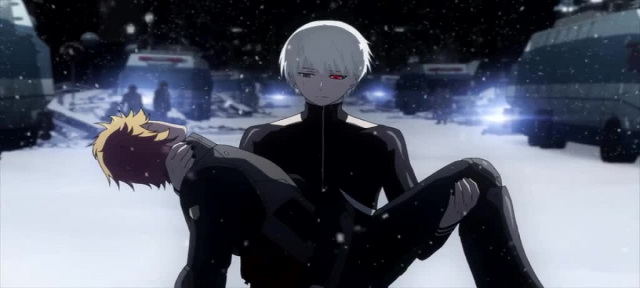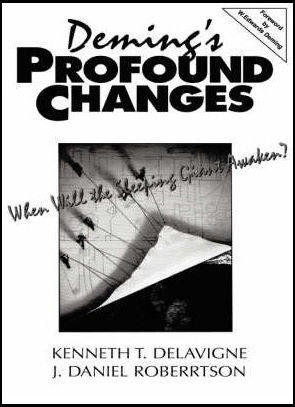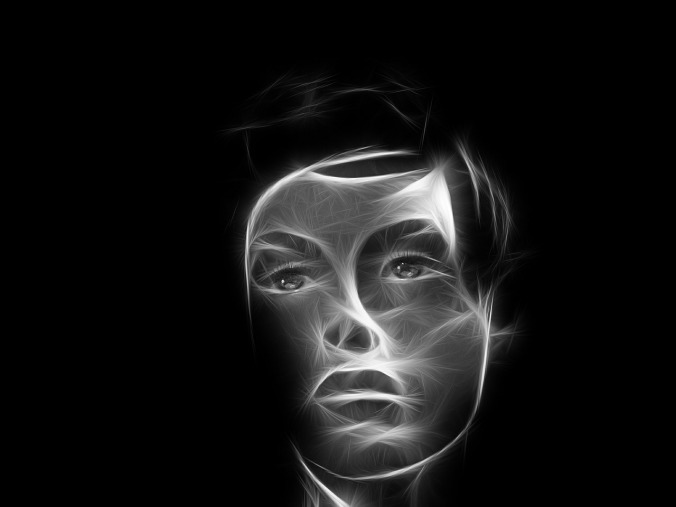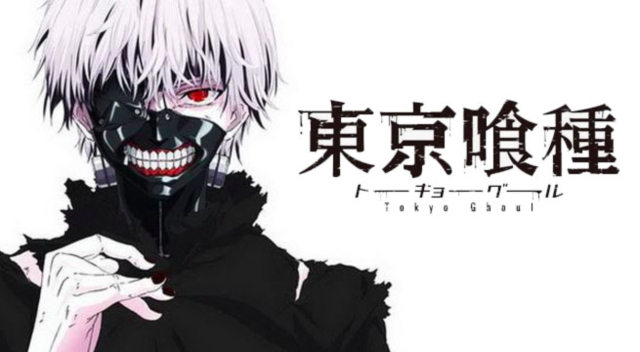
Tokyo Ghoul is a Dark Fantasy-type anime produced by Studio Pierrot in 2014. It contains 24 episodes total, plus 2 OVAs, both created by studio Pierrot as well.
The premise of the show is that there are these monsters called Ghouls that look like people, except they are very strong, fast, and resilient, have these wierd tail/weapon thingies, and can only eat human flesh. Basically a cross between a vampire and a zombie. So, this shy, nerdy college student named Ken Kaneki, finally works up the courage to talk to the girl of his dreams, a girl named Rize, who invites him out for dinner. Literally. But while she is in the process of eating him, a bunch of metal beams fall off a building and kill her. Kaneki wakes up to discover that Rize’s organs had been transplanted into his body to save his life, but in the process, he’s been transformed into a ghoul.
Struggling to cope with his new-found ghoul body (and the fact that he can no longer eat food), Kaneki magically transforms into a sobbing bawl-baby on par with Shinji Ikari from Eva. The edgy, tsundere, high-school barista and fellow ghoul, Toka, beats him up a few times, shoves human flesh down his throat, and eventually brings him back to the cafe that she works at, falling in love with him in the process. Edge ensues, followed by more crying, and some more edge. And for the sake of spoilers, i’ll stop there.
Before jumping into the actual meat of the review, let’s take an outside look at what makes this anime so appealing for audiences. First of all, looking purely at statistics, Tokyo Ghoul came out at a time when a large number of people began to watch anime. this means that, to a large number of people, they had never seen anything quite like Tokyo Ghoul before, and let’s be real, some of the scenes in the show are, frankly, quite shocking. This is what I call the “Shock Factor”.
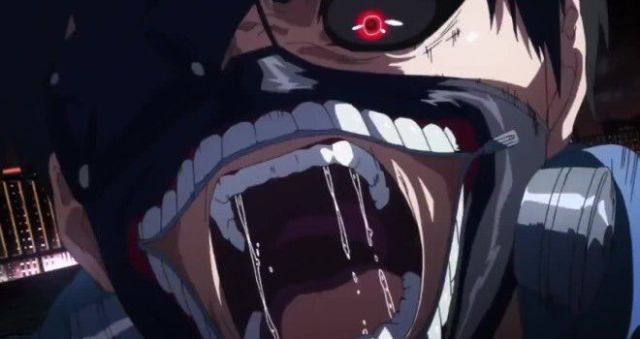
This “Shock Factor” is the same thing that Attack on Titan had when it first released. Scenes of ghouls eating people, people being impaled, ripped apart, etc. tends to leave a very strong impression on people, especially if they aren’t expecting it to happen.
Secondly, while this show has its ups and downs, and it’s really not one of my personal favorites, it does have several episodes that really stand out as exceptional. It’s definitely a truth that an episode can make a show, and Tokyo Ghoul is a fantastic example of that.
Boy-suddenly-becoming-a-monster-and-learning-to-cope isn’t exactly the most unique premise on the planet. It’s been used countless times. But Tokyo Ghoul has managed to gain widespread love and admiration from the Anime community, and is a favorite to many, many people. So let’s dig in. (get it, dig in, like… like eating… people… yeah ok.)
- Art: The art in Tokyo Ghoul is, to put it bluntly, fantastic. The colors are very vivid, the lines are smooth and crisp… The art of Tokyo Ghoul gets a definite 5/5
- Animation: Just like the art, the animation in this show is wonderfully done. Motion is fluid and precise, nothing feels blocky or disjointed in any way, and the animation takes full advantage of the art as it does its work. 5/5
- Music: As much as the art in Tokyo Ghoul is outstanding, the music is far less so. While the general soundtrack is pretty good, even great, it is used many times in places where it feels disjointed, even out of place. It’s not always like this, but it happened often enough to make me silently cringe inside. Also, i’m pretty sure the singer for the OP no longer has a voice, poor man. Music gets a 2/5
- Characters: Tokyo Ghoul has a relatively large cast of characters, ranging from edgy to creepy to just downright insane. And as varied as the characters are, so are their characterizations themselves. Personally, I actually think that Kaneki was the weakest character in the cast, but I adore Touka. It seemed like Kaneki was whiny and pathetic for the sake of being whiny and pathetic, but at sudden moments took a 180 and became awesome for about 2 minutes. This was further reinforced in season 2 when his character just totally changes, for no real reason at all. Touka, on the other hand, was a beautiful example of a ghoul trying desperately to live in human society, to hide her nature just so she can coexist with others. Because of Touka, 3/5
- Character Development: Calling back to the previous section, Tokyo Ghoul has a very large cast of characters. Yet so little of them actually get any meaningful development, maybe because half of them end up dead in the end anyways. The exceptions to this are Kaneki and Toka. Nearing the end of season 1, Kaneki starts to actually look like a decent character. And then he decides to go full edgelord and do a 360 noscope arrow to the knee on his character development. Season 2 we see far less of Kaneki, and far more of Touka. Touka is easily the most developed character in the series, in my opinion, and is one of the most genuine characters i’ve seen in all of the hundreds of shows that i’ve watched. 3/5
- Worldbuilding: As interesting a world as Tokyo Ghoul has to play off of, they seemingly put in such a small amount of effort to bring it to life. I would have loved to know more about the general lifes of the hidden Ghouls around the world, to know where the Ghouls came from and why they can do what they do. It’s a nice world, but there’s a lot of missed opportunity. 2/5
- Genre: As a Dark Fantasy sort of show, Tokyo Ghoul hits the nail right on the head. It’s not terrifically scary, but the world itself sure is dark, and there’s an abundance of satisfying fight scenes and gore to amuse yourself in. 4/5
- Tropes: Tokyo Ghoul seems, for the most part, trope-free. There’s some Tsundere from Touka, plus the classic guy-turns-into-monster thing, but apart from that, it doesn’t seem to really play to the normal Anime tropes at all. 5/5, well done.
- Plot: The plot of Tokyo Ghoul is, frankly, not one of my favorites. To me it feels really shallow, like a job that was done by cutting corners on important details. It leaves me feeling dissatisfied afterwards, like there was more that could have been. Like amazing potential had been wasted. (also, the manga had a better ending). 3/5
- Pacing: The Pacing of Tokyo Ghoul is all over the place. Sometimes it’s slow and methodical, other times it seems we’re blazing past plot points. I personally found that this actually makes the show work, 80% of the time. The other 20% of the time, however, I thought it was annoying. 4/5
- Personality: As far as personality goes, I feel like Tokyo Ghoul gathered such widespread attention because it had several episodes that were exceptionally good, causing most viewers to put aside some of the glaring issues that the show has. Those few episodes really were good, though. 4/5
- Personal Opinion: I watched Tokyo Ghoul, and I enjoyed it. It’s definitely never going on my top 10 list, but it was pretty enjoyable. I give it a 3/5.
And there we go. That sums up my full and complete evaluation of Tokyo Ghoul. So now, without further ado, based on the points given out in all the categories above, I hereby award Tokyo Ghoul a rating of:
7.2/10My personal recommendation for Tokyo Ghoul is that you binge-watch it. It’s more enjoyable that way. Grab a bowl of finger food… like popcorn, not actual fingers, and knock out one season in one night.
Please, let me know what anime you’d like me to review next in the comments, and thank you for your readership!
